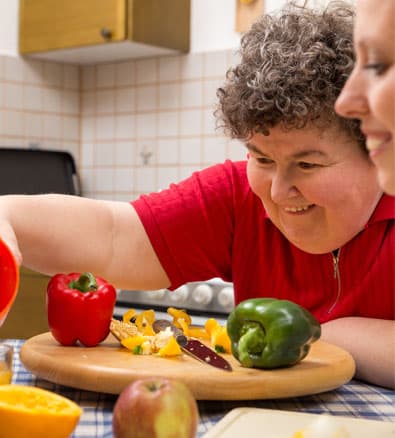NDIS Dietetics for People with Coeliac Disease
Dietetics and Coeliac Disease
How a dietitian can help people with disability manage coeliac disease
In Australia, it’s estimated that 80 per cent of people with coeliac disease don’t know that they have it[i]. Coeliac Awareness Week, from March 13-20, aims to raise awareness of the condition and improve diagnosis rates. Getting a diagnosis and the right treatment is essential to reduce the risk of both short-and long-term health complications.
Coeliac disease is more common in people with Down syndrome. Active Ability’s NDIS Dietitians talk about coeliac disease, and how high-quality dietetic support can help people with disability live well with the condition, enjoy the best possible quality of life, and reduce their risk of developing complications associated with it.

Dietetics matters in the management of coeliac disease.
What is coeliac disease?
Coeliac disease (pronounced ‘seel-ee-ak’) affects both men and women and can occur at any age. It is an autoimmune condition in which your immune system reacts abnormally to gluten – a protein found in wheat, barley, oats and rye.
If people with coeliac disease eat these foods, it leads to inflammation and damage to the tiny, finger-like projections (called ‘villi’) in the bowel. This reduces the available surface area the bowel has for absorbing nutrients.
A range of symptoms can result from this, including nutrient malabsorption and gastrointestinal symptoms such as bloating, gas, nausea, constipation and diarrhoea. Dietetics plays an integral role in the management of coeliac disease.
If the condition is not correctly diagnosed and managed, it can lead to long-term health issues including[ii]:
- iron deficiency anaemia
- early onset osteoporosis or osteopenia
- infertility or miscarriage
- type 1 diabetes
- short stature
- vitamin and mineral deficiencies
- nervouse system disorders
- gastrointestinal cancers
What causes coeliac disease?
While the cause of coeliac disease isn’t fully understood, it has been linked with specific genes and is known to run in families. For example, your risk for developing coeliac disease is about ten times higher if you have a sibling or parent with the condition[iii].
Environmental factors (such as a gastrointestinal infection) may trigger the disease in people with the genetic predisposition for it.
Coeliac disease is estimated to affect approximately 1 in 70 Australians[iv]. However, it is more common in people with Down syndrome, in which it is estimated to affect 5–15 per cent of individuals[v].
Down syndrome is also associated with intellectual disability, and these individuals often require some extra support to manage coeliac disease. This is where the experienced dietitians at Active Ability can really help.

How might coeliac disease affect me?
Some common symptoms of coeliac disease include[vi]:
- Persistent gastrointestinal symptoms, such as nausea, vomiting, gas, bloating, cramping, diarrhoea and constipation
- Vitamin and mineral deficiencies, including iron deficiency anaemia
- Persistent fatigue, weakness and lethargy
- Failure to thrive or delayed puberty in children
- Unexplained weight loss
- Severe or recurrent mouth ulcers
- Skin rashes
It’s important to note that coeliac disease symptoms vary significantly from one person to the next and range from mild to severe. Some people have no symptoms whatsoever.
For one of Active Ability’s NDIS clients (we’ll call her Jenny), her main coeliac disease symptom was intermittent constipation related to occasional poor adherence to a gluten-free diet. Her intellectual disability also impacted her eating habits and capacity to plan and make decisions that aligned with her NDIS goals. This is why dietetics can be crucial when managing the coeliac disease.
How can a dietitian help me manage coeliac disease?
Eating a gluten-free diet is the treatment for coeliac disease. This leads to symptom resolution, small bowel healing, and reduced risk of developing coeliac-related health issues.
Because Down syndrome is also associated with low muscle tone, it effectively reduces the individual’s metabolic rate and makes it more difficult for them to maintain a healthy weight. Jenny also had obesity, which was further impacting her health, function and ability to participate in her community.

Dietitians can support you to achieve better health and function through healthy nutrition
As experts in nutrition, dietitians take a holistic approach to support the individual to achieve greater health, function and quality of life through healthy eating choices.
When it comes to dietetics, an Accredited Practicing Dietitian can assist people with coeliac disease to identify the different types of foods to avoid, and the alternatives to include, so you can enjoy a varied diet with all the nutrients needed for good health.
For Jenny, working with a dietitian from Active Ability was about supporting her to understand and improve her practice of healthy eating so she could better manage disability-related health concerns, improve her independence, and participate in a more active lifestyle.
Here’s what working with a dietitian looks like:
1. Assessment
To develop a dietary plan that’s right for each individual, it’s vital your dietitian understands more about you. An assessment will cover things like your medical history, symptoms, usual diet, and living situation. Your dietitian will also want to know about the goals you’d like to achieve, such as weight loss, experimenting with different foods, or becoming more independent with your meal planning and preparation.
In Jenny’s case, for example, assessment included looking at her medical and social history and medications. Her dietitian also assessed Jenny’s current level of function with nutrition-related tasks, including meal planning, grocery shopping, meal preparation/cooking, and eating and drinking.
Jenny’s NDIS goals included becoming more active and building her strength and stamina with the support of allied health professionals, along with building confidence and independence by accessing her community.
2. Planning
Armed with the assessment findings, a dietitian will work with you to create a plan for achieving your goals. Jenny, for example, was mostly dependent on informal supports for nutrition-related activities of daily living, and needed a plan for working towards her goal of increased independence.
This involved enlisting dietetic support to assist her in building independence with nutrition-related activities and reduce her reliance on informal supports. An important part of the plan also included training Jenny’s formal supports to assist her with implementing the recommended dietary (and exercise) interventions.
3. Treatment
Once you have a plan, face-to-face (or telehealth) sessions will help you work towards achieving your goals. For people with coeliac disease, this might include things like learning which foods to eat and which to avoid, and how to read food labels and prepare healthy gluten-free meals.
Your treatment will be about building your capacity to understand your condition and make healthy eating choices that support your mental and physical wellbeing, function and quality of life.
For Jenny, treatment involved developing strategies to help her adhere to a gluten-free diet, trialling new foods and drinks, and adding more water and nutritious vegetables into her daily eating plan.

A dietitian can show you how to find gluten-free recipes and places that serve gluten-free foods
4. Monitoring and progression
Throughout your treatment, a dietitian will monitor your progress and help you set new goals accordingly. For example, once you know how to read food labels, you might learn to find and follow simple recipes to prepare gluten-free meals. Then you might develop strategies to help you stick with your gluten-free eating plan. For example, you might create a list of gluten-free alternatives for your favourite snack foods, or how to use the internet to find cafes and restaurants that serve gluten-free foods.
5. Training of supports
Another key part of Jenny’s program was training her support people. Because of her intellectual disability, Jenny has a reduced capacity to understand nutrition and health information and the impact of poor lifestyle choices on long-term quality of life and morbidity. It also takes longer for Jenny to understand new information and put new dietary patterns into practise.
The goal of capacity building is to support the individual to become as independent as possible with their dietary choices, with the goal of removing (or reducing) the need for input from allied health professionals. Training and educating Jenny’s support workers to facilitate her dietary (and exercise) interventions is vital to her long-term success.
6. Working with other health professionals
To ensure you get the best possible health outcomes, your dietitian might also recommend getting support from other health professionals, such as an exercise physiologist or physiotherapist.
A large and growing body of evidence shows regular physical activity is vital for physical and mental health[i]. Given that coeliac disease is linked with various other health conditions, it makes sense to do everything possible to meet the recommended guidelines for physical activity.
In Jenny’s case, one of Active Ability’s exercise physiologists worked with Jenny to implement a physical activity program geared at improving her upper and lower body strength, walking endurance and managing her weight.
In conjunction with her dietary program for coeliac disease, these were all aimed at the bigger picture of supporting Jenny to achieve her goals of becoming more active, building strength and stamina, and improving her independence by accessing the community.
Do you have an intellectual disability, neurological condition or mental health issue and need support for managing coeliac disease?
At Active Ability, we have no wait times or travel charges, which means you’ll be seen quickly and can make the most of your NDIS funding.
Our dietitians are highly experienced at helping people to function better and achieve greater independence through tailored assessment, eating plans and advice.
As mobile service providers, our friendly and skilled dietitians can see you at your home, school, workplace, or preferred facility.
Click here to find out more about our dietetic services for people with mental health conditions, neurological disorders and intellectual disability.
Or get in touch with our helpful team on
(02) 8678 7874, hello@activeability.com.au
or via our contact form
References:
[i] https://www.coeliac.org.au/s/coeliac-disease/coeliac-awareness-week Accessed 8.3.2021
[ii] https://celiac.org/about-celiac-disease/what-is-celiac-disease/ Accessed 8.3.2021
[iii] https://www.healthdirect.gov.au/coeliac-disease Accessed 8.3.2021
[iv] https://www.coeliac.org.au/s/coeliac-disease Accessed 8.3.2021
[v] https://www.racgp.org.au/download/documents/AFP/2011/April/201104tracy2.pdf Accessed 8.3.2021
[vi] https://www.coeliac.org.au/s/coeliac-disease/symptoms Accessed 8.3.2021
[vii] https://www.healthdirect.gov.au/exercise-and-mental-health Accessed 8.3.2021